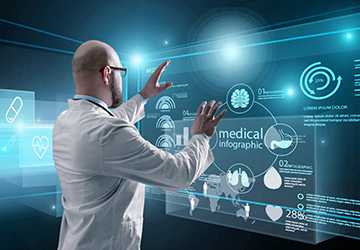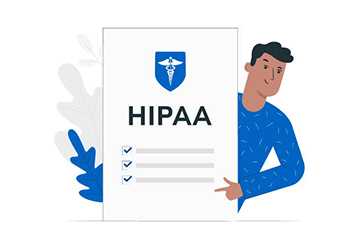The Impact of Artificial Intelligence in the Healthcare Sector
AI fundamentally changes the healthcare industry, transforming everything from patient diagnosis to treatment plans. Imagine a world where medical professionals can predict disease before it strikes or customize treatments based on a person's genetic makeup. That's the reality we can create using AI. AI improves healthcare by increasing efficiency, precision, and personalization. Intelligent algorithms analyze medical images with extreme accuracy, while virtual medical assistants support patients throughout their treatment journey.

The global AI healthcare market is expected to reach $188 billion by 2030, growing at a CAGR of 37% from 2022 to 2030. About one in five healthcare organizations have already adopted AI models in their healthcare solutions. Let's explore how AI will transform healthcare in 2024 and what this means for patients and providers.
The Relevance of AI to Healthcare
Improving Data Analysis and Diagnosis
AI, which uses machines to mimic human intelligence, has transformative potential for healthcare. AI algorithms can use patient records, medical images, and research to detect patterns and connections that human analysts may miss. The role of AI in health diagnostics is enormous. It enables doctors to make more informed decisions, leading to faster, more accurate diagnoses.
Advanced Predictive Analytics and Personalized Care
AI improves predictive analytics, enabling healthcare providers to predict patient outcomes based on historical data and current health indicators. For example, trained models can predict the likelihood of disease progression in patients with chronic conditions, enabling early intervention and personalized treatment plans. AI's ability to process and analyze data at such a scale dramatically improves the precision of medical research and aids in discovering new treatments and therapies.
Real-time Clinical Decision Making
In clinical settings, AI-driven tools support real-time decision-making. AI systems can provide surgeons with improved visualization and key insights during surgery, improving surgical precision and patient safety. Additionally, AI helps manage and interpret genetic information, which is critical in the growing field of genomics. By analyzing genetic data, AI helps identify genetic predispositions to certain diseases, enabling preventive care and personalized medicine.
AI in Healthcare
Diagnostic and Imaging Tools
AI excels in medical imaging. Algorithms analyze X-rays, MRIs, and CT scans with superhuman accuracy. For example, Google's DeepMind can diagnose eye diseases as accurately as the world's best experts. AI can identify abnormalities the human eye might miss, enabling earlier and more accurate diagnoses.
Personalized Medicine
AI enables personalized medicine by analyzing genetic information. Companies like 23andMe and AncestryDNA use AI to provide genetic insights. Doctors can tailor treatments based on a patient's genetic profile, increasing efficacy and reducing side effects. Predictive analytics also help create personalized treatment plans and improve patient outcomes.
Virtual Health Assistants
AI-powered chatbots and virtual health assistants are becoming more common. These tools can answer patient inquiries, schedule appointments, and provide health advice. For example, Babylon Health's AI can diagnose illnesses based on patient symptoms, improving accessibility and convenience.
Benefits of Using AI in Healthcare
Reduced Costs
AI significantly reduces healthcare costs by automating routine tasks and taking over repetitive administrative tasks like appointment scheduling, billing, and patient record management. According to a study by Accenture, AI applications could save the U.S. healthcare industry up to $150 billion annually by 2026. Additionally, AI reduces human errors in medical documentation and data entry, a known source of financial losses for health facilities. These systems ensure that healthcare providers make informed, data-driven decisions, reduce unnecessary tests and procedures, reduce costs and improve overall operational efficiency.
Remote Patient Monitoring
AI supports remote patient monitoring and telemedicine, enabling healthcare providers to care for patients outside traditional clinical settings. Wearable devices with AI algorithms can monitor patients' vital signs, activity levels, and medication adherence in real-time and transmit data to healthcare providers for remote monitoring and intervention. These advances highlight the benefits of AI in patient care and healthcare management.
AI-driven telemedicine platforms enable virtual consultations, remote diagnosis, and patient education, expanding access to healthcare services.
Challenges and Ethical Considerations
Privacy and Security Concerns
AI relies on large data sets, which raises significant privacy and security concerns. Protecting patient data is critical, requiring healthcare providers to comply with strict regulations such as HIPAA to ensure data security.

Bias in AI Algorithms
AI algorithms can perpetuate bias when trained on biased or incomplete data sets. For example, if a facial recognition algorithm is trained primarily on images of light-skinned people, it may have difficulty recognizing dark-skinned people, leading to discriminatory results. Similarly, AI algorithms in healthcare that are trained on data from primarily affluent or homogenous populations may not accurately represent the diverse range of patients they encounter in clinical practice.
Patient Consent and Autonomy
AI-driven healthcare interventions impact patient autonomy and control over their healthcare decisions.
Future Trends and Innovations
AI-driven Drug Discovery
Recent advances in artificial intelligence have revolutionized the drug discovery process by enabling researchers to explore new avenues for drug development. One exciting area of research includes deep learning algorithmic knowledge for predicting protein structure, a critical step in understanding how drugs interact with their targets in the body.
In addition, AI-driven molecular simulations optimize drug candidates by predicting their pharmacokinetic properties and potential side effects, leading to safer and more effective treatments.
Medical Robotics
Integrating medical robotics with AI capabilities reshapes surgical practice and patient care across specialities. One significant advancement is the use of robotic systems in minimally invasive surgeries, including laparoscopic and robot-assisted laparoscopic surgeries.
Conclusion
In summary, the integration of AI in healthcare is revolutionizing patient care and medical innovation. As AI technologies advance, they offer transformative solutions to long-standing challenges. However, with these advances come ethical considerations that must be addressed to ensure patient privacy and fairness. By leveraging AI to address these challenges, healthcare can benefit from more intelligent, more efficient practices, ultimately improving patient outcomes and advancing the field.
Related Posts
- 6 Tips for Resolving Slow Internet Speeds at Home
- Recent Advances and Applications of Artificial Intelligence
- 4 Features of AI-Enhanced Video Editing Tools for Creators
- How to choose the exemplary cloud storage service
- Emerging Sustainable Tech Innovations Shaping a More Environmentally Friendly Future
- 10 Best Noise-Canceling Headphones for Focusing